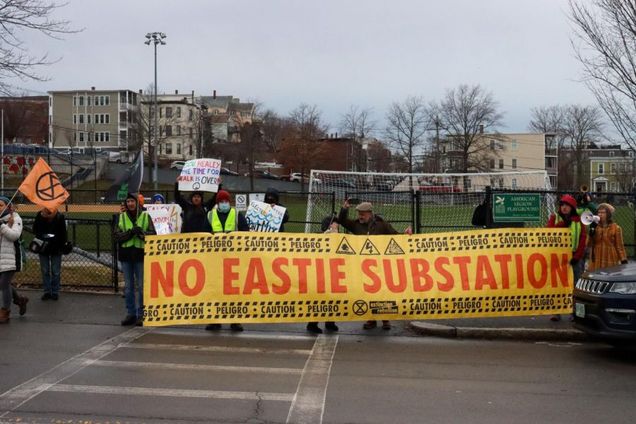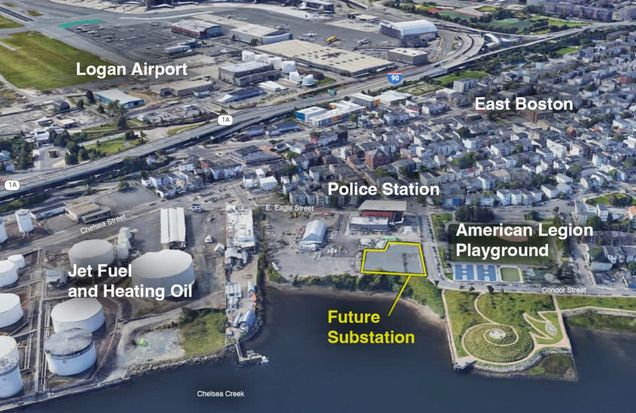The East Boston Electrical Substation: Lessons for the Future of Environmental Justice During Massachusetts’ Quest for Zero-Emissions
Massachusetts was an early adopter of environmental justice principles. In 2002, the Commonwealth adopted an Environmental Justice Policy, requiring the Executive Office of Environmental Affairs to make environmental justice “an integral consideration to the extent applicable and allowable by law.” The policy was updated in 2021, after An Act Creating a Next Generation Roadmap for Massachusetts Climate Policy was signed into law by then-Governor Baker. This landmark bill commits Massachusetts to net-zero greenhouse gas emissions by 2050, while also promising that the actions taken to achieve this goal will be done “equitably and in a manner that protects low- and moderate-income persons and environmental justice populations.”
Despite the Commonwealth’s apparent dedication to environmental justice, one particularly contentious project has shown the limitations on that promise. In 2014 (the same year that Executive Order 552 created the Governor’s Environmental Justice Advisory Panel and twelve years after the Commonwealth adopted the first Environmental Justice Policy), Eversource proposed an electrical substation in East Boston. The substation project was aimed to reduce the burden on the Chelsea substation, which also serves East Boston. Eversource estimated that, by 2024, the Chelsea substation would be unable to handle the needs of both neighborhoods.
There is no question that expanding the capacity of the electrical grid is a key step in moving toward Massachusetts’s zero-emissions goals. However, the East Boston substation is not an obvious step in the right direction, especially when considering the Act’s requirement that the zero-emissions goal be achieved in an equitable manner.
East Boston is already the home of numerous environmental nuisances. Boston Logan International Airport is located there, with all of its noise and air pollution. It’s the home of most of the Boston area’s stored heating oil and jet fuel, and also the storage location for large piles of road salt. Multiple highways also run through the neighborhood. It is, and has been, a designated Environmental Justice Community, the term Massachusetts uses to identify locales where there are prevalent environmental injustice concerns.
The new substation will only add to the burdens already placed on this community. The site is near a popular playground, causing concern for parents. It also takes away green space in an already industrialized area. Further, the substation is sited on the banks of Chelsea Creek, which makes it susceptible to flooding, especially as sea levels rise due to climate change. Eversource says that it is outside of the 100- and 500-year flood plains, but climate scientists note that flood plains move further inland as water levels rise.
East Boston has a significant minority population; 56% of residents are Hispanic, and 70% of the residents who live close to the new substation site speak a language other than English. While Eversource and the City of Boston knew this, energy company officials determined that providing Spanish translators at community meetings about the project would be disruptive. The written materials that were translated were translated inaccurately. Community meetings were held during the working day, making it impossible for working residents to attend, and while meetings were held on Zoom, many East Boston residents lacked the technology or knowledge to access those meetings.
The Commonwealth was required by law to take community input into account during the permitting process. Because the feedback process was so inaccessible to the East Boston community the state was sued under Title VI for discrimination based on national origin, with the plaintiffs asking for federal intervention. However, the Environmental Protection Agency declined to investigate and are now the subject of their own lawsuit.
Prior to any decision on the Title VI complaint, the Energy Sitings Facility Board tentatively approved the substation’s final location in February of 2021. The same year, 84% of Boston voters disapproved of the substation’s location; however, the ballot initiative was non-binding.
In a final blow by the Commonwealth against East Boston, the Energy Sitings Facility Board granted Eversource a Certificate of Environmental Impact and Public Interest, allowing Eversource to bypass 14 state and local permitting requirements. However, new injustices continue to arise. Immediately after receiving the certificate, Eversource updated the estimated cost of the substation from $50 million to $103 million, and it will surely “pay” for those costs by raising energy prices for its customers.
Further, as part of the 2021 approval, the Commonwealth required Eversource to negotiate a Community Benefits Agreement, where Eversource would engage in mitigation measures to counter environmental impacts caused by the new substation. The natural assumption, of course, would be that Eversource would pay for these projects. That assumption is incorrect. Eversource intends to pass those costs onto ratepayers.
To recap, East Boston will be the home of a new electrical substation. Eversource broke ground in early 2023. The substation was approved despite overwhelming disapproval by the area’s residents, after said residents were effectively barred from engaging meaningfully in the permitting process. It is being built in an area already known to be affected by environmental injustice. Despite numerous challenges, courts have upheld the project every step of the way. Additionally, the costs of this project and environmental mitigation measures agreed to by Eversource will be passed on to the very community that did not, and still does not, want it to be there.
The 2021 Act Creating a Next Generation Roadmap for Massachusetts Climate Policy is a major step in the right direction toward ensuring injustices like these will not happen again (the Act is not retroactive, meaning that the East Boston substation project could not be retroactively disapproved). By expanding the definition of what an environmental justice community is and requiring that the Commonwealth consider existing pollution in communities when evaluating proposed projects, there is more room for court enforcement of environmental justice violations. As one staff attorney at Roxbury-based Alternatives for Community and Environment put it, “the new bill adds more clarity and lays out more tools for the community to use to be able to participate the way that they should in these decisions.”
However, the Act is not a panacea and there is still work to be done. In its decision allowing Eversource to bypass state and local environmental regulations, the Energy Sitings Facility Board declared that, even in light of the new Act, “it has fulfilled all applicable environmental justice and LAP [the Commonwealth’s Language Access Policy] requirements in this proceeding, and that this decision is compatible with all applicable environmental justice and LAP policies.” This is not a good sign for how the Board will handle future siting projects if it thinks that the East Boston substation project complied with the Act’s environmental justice requirements.
A bill filed by Representative Madaro, H.3187, An Act Relative To Energy Facilities Siting Improvement To Address Environmental Justice, Climate, And Public Health, addresses these concerns. Hopefully, it will be made into law and add to Massachusetts’ new protections for environmentally vulnerable communities. However, as Massachusetts industry ramps up to meet zero-emissions goals, more conflicts will undoubtedly arise. The Massachusetts Legislature took an excellent step forward with An Act Creating a Next Generation Roadmap for Massachusetts Climate Policy, but it cannot rest on its laurels. It needs to continue to pay attention to environmental justice, especially as the energy industry changes in the next few decades, and not forget the harm done to East Boston.
 Helen Warfle anticipates graduating with a JD from Boston University School of Law in May 2025.
Helen Warfle anticipates graduating with a JD from Boston University School of Law in May 2025.



